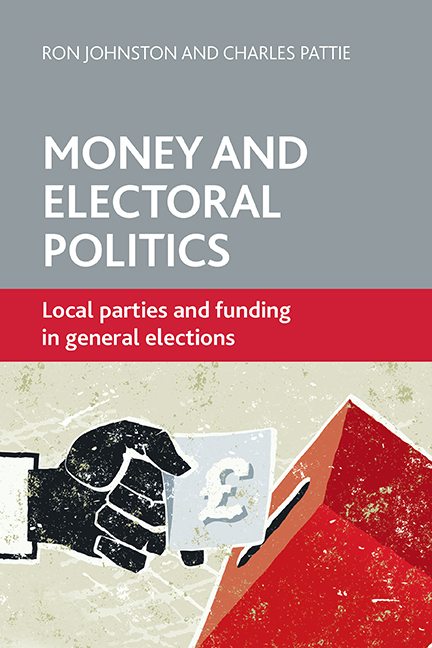Book contents
- Frontmatter
- Contents
- List of tables and figures
- About the authors
- Introduction
- one Follow the money: cash, party and electioneering in Britain
- two Money matters: local campaigns at British general elections
- three The financial health of local parties: the key to electoral success?
- four Raising the money: donations to local parties
- five Party funding futures
- In conclusion
- References
- Index
four - Raising the money: donations to local parties
Published online by Cambridge University Press: 24 February 2022
- Frontmatter
- Contents
- List of tables and figures
- About the authors
- Introduction
- one Follow the money: cash, party and electioneering in Britain
- two Money matters: local campaigns at British general elections
- three The financial health of local parties: the key to electoral success?
- four Raising the money: donations to local parties
- five Party funding futures
- In conclusion
- References
- Index
Summary
Chapter Three has shown that donations are a substantial source of income to local constituency parties, and thus indirectly to their candidates’ campaigns. In 2009, for example, over £6 million was donated to those units that made returns of their income and expenditure to the Electoral Commission, and in 2010 that sum exceeded £8 million (see Table 3.8). Given that only a minority of local parties reported on their income and expenditure to the Commission – albeit in general those which spent most on their general election campaigns in the latter year – this is undoubtedly an understatement of the total amount donated to the three parties’ local accounting units; the total amount donated in 2010 almost certainly exceeded £10 million. What sources were being tapped and which local parties were the recipients of the largest amounts? In this chapter, we explore two separate sources of information that can be used to address that question.
Reported campaign donations in 2010
The data published by the Electoral Commission for spending on the long and short campaigns – discussed in Chapter Two – include not only the total amounts spent by each candidate in each constituency, but also the amount that the candidates received in donations, divided into those which were under and those which exceeded £50. (This threshold is applied because for donations below £50 candidates do not have to check whether they comply with the legal requirements.) No information is provided on the number of donations, however, which limits the utility of these data. Nevertheless, they provide some insights into how local campaigns were funded.
In a large number of cases – and especially for spending on the short campaign (that is, in the period between the writs being served and polling day) – the amount received in donations exactly equals the reported amount spent. This is in line with earlier research on the funding of local campaigns: analysis of the detailed returns made by each candidate for the 1997 General Election – and therefore for the short campaign only – showed that the great majority obtained the financial resources from a single source only, the local political party (Johnston et al, 1999).
- Type
- Chapter
- Information
- Money and Electoral PoliticsLocal Parties and Funding at General Elections, pp. 123 - 150Publisher: Bristol University PressPrint publication year: 2014



